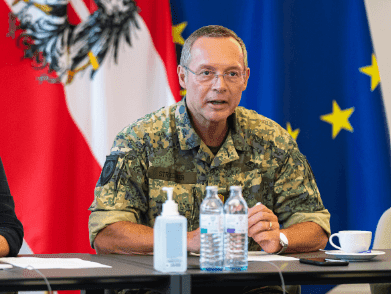The Commission for National Covid Crisis Coordination (GECKO), established in December 2021, will be "orderly" terminated on March 31 and its operations will be phased down gradually. According to the Chancellor's Office on Monday evening, Chancellor Karl Nehammer (VP) is following the Commission's majority suggestion. Many members of the panel had reportedly expressed a desire to resign in protest, which several of those impacted confirmed on Tuesday.
Actually, the advisory council located in the Federal Chancellery's mission would have lasted until June. The panel itself proposed the early termination during its meeting on Monday. The departments' usual activities will now include crisis coordination. The majority judgment was communicated to the Federal Chancellor by GECKO chairman Rudolf Striedinger.
According to media reports, the present request for dissolution occurred after a meeting at which some members intended to submit their resignations. On Monday, the "Kurier" reported that at least three members of the committee intended to leave. The specialists, according to the newspaper, were virologist Andreas Bergthaler, simulation researcher Niki Popper, and Major General Thomas Starlinger.
According to the newspaper story, Chancellor Nehammer's comment that one had been "listening to specialists" too much throughout the epidemic had irritated them much. The changes in Lower Austria, however, proved pivotal. Under their working agreement, the VP and FP agreed to halt all coronavirus vaccination promotion and to pay back CoV fines.
On Tuesday, virologist Bergthaler revealed on Twitter that he and other commission members had announced their retirement from the panel in April. "My motivations were due to political changes that I could no longer reconcile with the initial consulting mission," Bergthaler says. Another problem was the committee's unclear work order until the committee's scheduled finish in June." This is also due to the fact that the "acute crisis no longer exists in this form," according to Bergthaler.
Simulation researcher Popper, according to his own words, concurred with Bergthaler's views. He, too, had stated that he would be leaving in April. Meanwhile, models for queries that may be posed in GECKO are less useful (for formal reasons), he noted on Twitter. Additional concerns "have become increasingly relevant, such as the interaction of Covid-19 with other infections" and "integrated treatment" between hospitals and clinicians.
Popper went on to say that he "critically examines" the evolution outside of the committee. "One hears the loud and the rumbling (from all sides:-) but science should aid that the quiet ones be heard. "I perceive a risk that some of our gains in Gecko may be reversed," he tweeted.
Formed in 2021
The government established the expert group in December 2021. It is made up of around 20 professionals. The panel, led by Dr. Katharina Reich, Director General for Public Health, and Rudolf Striedinger, Chief of Staff, was tasked with informing and advising the government. The committee voted at the end of January to keep the virus surveillance going even after the CoV measures were announced for the middle of the year.
Nehammer "expressly congratulated the specialists for their volunteer labor, who have followed the Federal Government throughout this difficult moment, supporting and advising them with their experience," according to the Chancellery release. This was a "really stressful and exceptional moment for all of us, which asked a lot from everyone involved," according to the author.
"It is all the more satisfying that we have finally passed through this era of pandemic management and are better prepared for future problems," it stated. The conversation process on CoV management, as indicated by Nehammer, should begin after Easter. The Academy of Sciences is now working on the details of the procedure "in which society is given the opportunity to work through this unique weight of the epidemic," according to the media reports.
Even if nobody wanted to talk about resignations after the GECKO meeting, in a written statement - even before the official announcement of the GECKO dissolution - Health Minister Johannes Rauch (Greens) had at least spoken of such resignations. He mentioned a "appreciative cooperation" in the past few months. "That's why I regret the resignations from the GECKO Commission," said Rauch. Of course, the minister has not yet spoken of dissolving the commission.
Striedinger said after the meeting that he did not feel disregarded by politicians: "The Chancellor has always listened to us," he said - but now the time has come when the judgment has come that the advisory work is no longer necessary. The infectiologist Herwig Kollaritsch told the ZIB that he had not been able to do any significant work for GECKO since December, which was reflected in a political decision.
But, according to Kollaritsch, it is incorrect that the state of Lower Austria, in accordance with the VP-FP deal, no longer want to promote CoV vaccination. Many people are at danger of missing their ideal vaccination date and becoming extremely unwell as a result. Nevertheless, virologist Dorothee von Laer believes that there will be no severe consequences because the Ministry of Health, not the state, is in charge of this.

